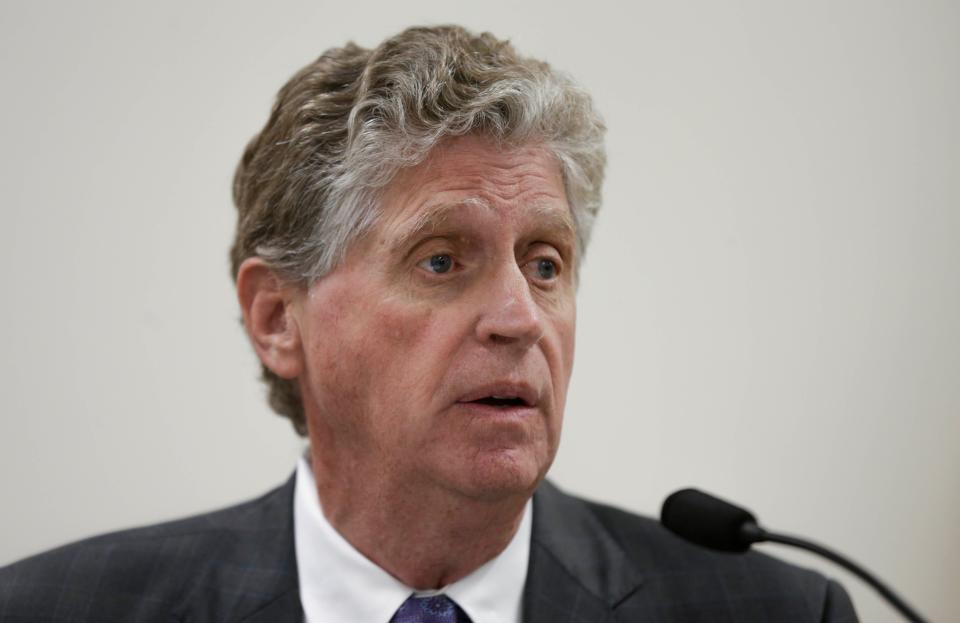Governor's defense against ethics complaint: He didn't know a lobbyist paid for his lunch
- Oops!Something went wrong.Please try again later.
PROVIDENCE – Gov. Dan McKee's defense lawyer contends he cannot be guilty of a "knowing and willful" ethics violation because he had no clue that a lobbyist had paid for his fundraising lunch at the Capital Grille last January with top executives from the Philadelphia firm hired to redevelop the Cranston Street Armory.
It's a somewhat novel but potentially winning argument for the Democratic governor facing a potential decision Tuesday by the state Ethics Commission on the complaint that state GOP chair Joe Powers lodged against him.
The complaint is one of three up for potential Ethics Commission votes on Tuesday, all centering on the McKee administration's interactions with Scout Ltd., the urban design firm the McKee administration hired last June to come up with a reuse plan for the abandoned Cranston Street Armory.

The other two revolve around what happened last March when James Thorsen, then director of the state Department of Administration, and David Patten, then head of the state's property management division, went to Philadelphia to see an award-winning project by Scout.
Those complaints were filed by the Ethics Commission's own deputy chief investigator, Kevin Santurri.
What is McKee accused of in the ethics complaint?
The McKee complaint accuses the governor of violating the state ethics code "by accepting a gift, a free lunch, in excess of $25" from a lobbyist for a state vendor, and then failing to reimburse the lobbyist, Jeff Britt, for his share of the $228 tab until The Journal disclosed the lunch five months later. (At the lunch, Britt also wrote a check for $1,000 to McKee's campaign account.)
There has been more than one account of what happened that day.
More: In State of State address, McKee vows boosts to education, small business, health care
In his written response, McKee's lawyer Michael Kelly told the Ethics Commission "there is not a scintilla of evidence that the Governor knowingly and willfully" accepted a gift in excess of $25 in violation of the ethics code.
He said: "The Governor did not stay for the entire lunch as he had another appointmenton the state budget," and left the bill-paying to his chief fundraiser at the time, Jerry Sahagian.
"The Governor and Sahagian walked away from the table together as the Governor was exiting Capital Grille. The Governor stated to Sahagian, 'you got the lunch right?', indicating to Sahagian he expected Sahagian to pay for the lunch. Sahagian replied 'yes' confirming to the Governor that he would pay for the lunch bill."
According to Kelly's account, Sahagian subsequently realized he did not have the campaign credit card with him. Britt paid the bill and two days later sent a copy of the receipt for the lunch to Sahagian via text message.
"Sahagian was not in his office that Saturday and was on vacation skiing at the time Mr. Britt sent the text message. Sahagian intended to submit the invoice for reimbursement once he returned to the office the following Monday but forgot," Kelly wrote.
Britt was reimbursed following The Journal's publication of a story about the free lunch in June. Powers' response at the time: "Refunding a gift immediately after you have been exposed by the media does not comply with the Ethics Code."
In his subsequent response to Kelly's arguments, Powers wrote: "McKee cannot avoid responsibility ... by blaming a member of his campaign team."
What happened in a prior ethics complaint against Gov. Donald Carcieri?
In an earlier instance, he noted, then-Republican Gov. Donald Carcieri's campaign reached a settlement with the Ethics Commission that required him to pay a $1,000 fine for soliciting donations from various state employees.
"This solicitation was handled by Carcieri’s campaign manager and a consultant. Although Carcieri personally 'had no knowledge' that his campaign was sending a solicitation to state employees," Powers noted, the governor still had to pay a fine.
More: RI historian Pat Conley says he unknowingly ran afoul of IRS 'self-dealing' rule
That complaint was filed by a Powers counterpart – then-state Democratic Party Chairman William J. Lynch, who said at the time that the amount of the $1,000 fine was "irrelevant" – the settlement itself demonstrated that the commission "thought this was relatively serious."
According to Powers, McKee displayed an "indifference to following the Ethics Code" when the lunch was first reported: “If Jeff wants the money back, I’ll give him the money back.”
Separately, the commission voted unanimously to investigate the allegations in complaints filed by Santurri, its own deputy chief investigator, against the two state officials who went on the March 10 trip to Philadelphia: James Thorsen and David Patten.
Thorsen was director of the Department of Administration at the time, and Patten the director of the Division of Capital Asset Management and Maintenance, a state agency responsible for the management and maintenance of all state-owned properties in Rhode Island, including the oversight of rehabilitation projects on state properties.
This article originally appeared on The Providence Journal: RI governor's lawyer seeks dismissal of GOP ethics complaint

